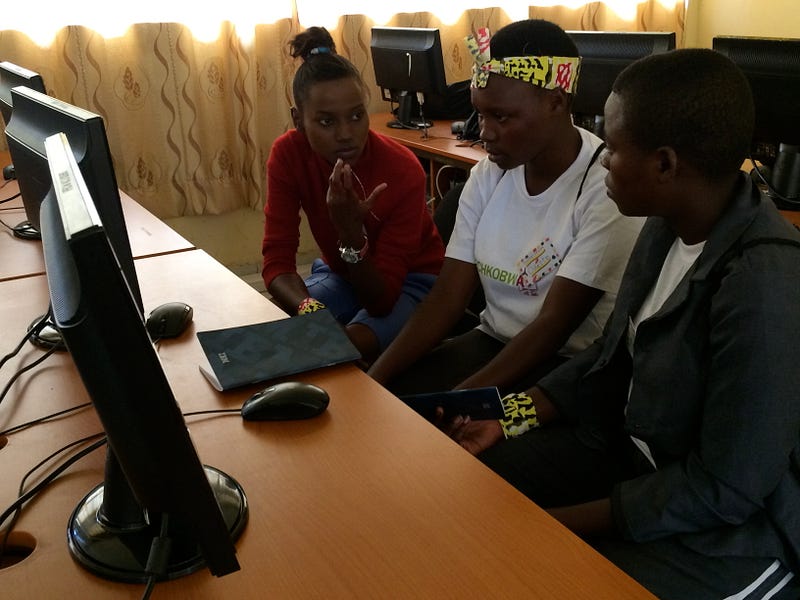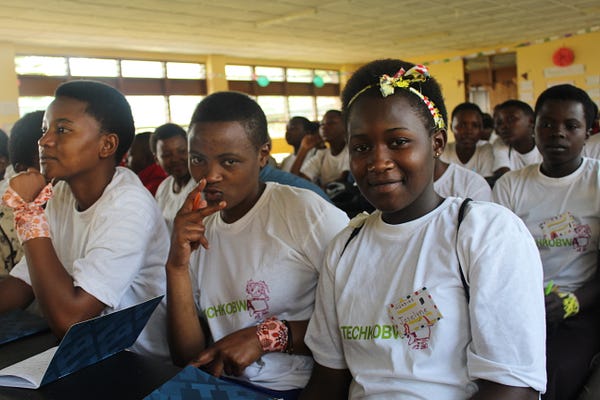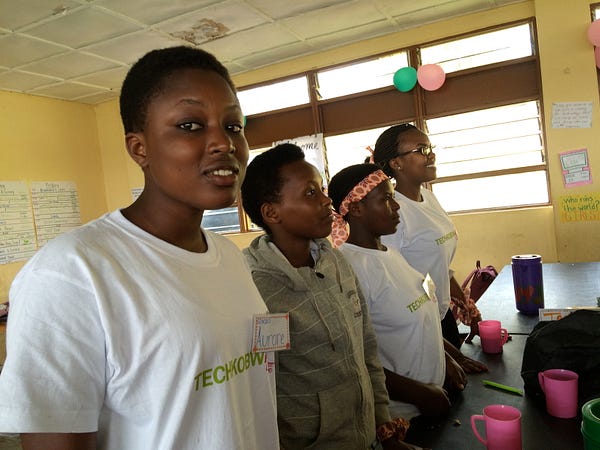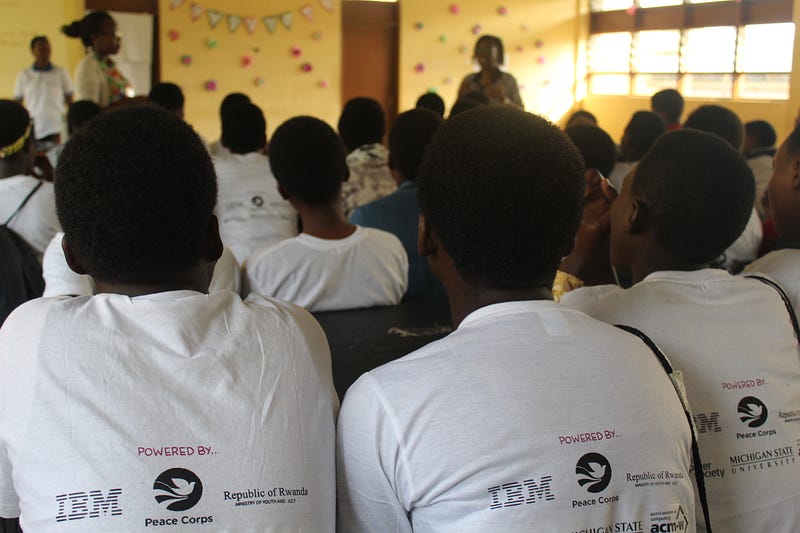Code Confident at TechKobwa
Akilah Institute students are inspiring girls in tech across Rwanda.

Akilah Institute student Diane mentoring camp attendees
“TechKobwa, we’re all about it!”
“We love computers, we want to shout it!”
Sixty young girls from all over Rwanda are clapping and cheering as they take turns shouting their team slogans during a tea break in between algorithm classes and innovation sessions. It’s day one of TechKobwa, a weeklong technology camp for girls in rural secondary schools, and the excitement from the group of tech-savvy teenage girls is palpable.
Confidence and Coding
Now in its fourth year, TechKobwa brings girls from all over Rwanda together to dive into technology and computer science, this year in Kibuye, next to Lake Kivu’s breathtaking shores. Organized by the Peace Corps in collaboration with Michigan State University, Rwanda’s Ministry of Youth & ICT, the Akilah Institute, and IBM, TechKobwa encourages young girls to explore technology, build their confidence, and use innovation to solve problems in their communities.
“We started TechKobwa after seeing how often rural schools teaching IT are lacking decent infrastructure; often students are only taught IT in theory without a chance of practicing it,” explains Elisabeth Turner, organizer of the TechKobwa camp.
“And when there are only a few computers at schools, you will very often find boys sitting at the computers and girls standing behind observing. We wanted to give girls an opportunity to try it out and test their curiosity through this tech camp,” she adds.

While the main purpose of the one-week camp is to spark girls’ curiosity and confidence within technology, the girls are also tasked to identify challenges in their communities and come up with ideas to solve them in the camp’s Mission Innovation Lab.
“This is about more than growing the girls’ ICT skills. It is also to help them gain perspective and see that they can be part of solving problems in their communities and in their country by being innovative and creative. It is for them to say, ‘If I study and practice, maybe I can make this happen.’ We want them to think big!” Elisabeth says.
“And when there are only a few computers at schools, you will very often find boys sitting at the computers and girls standing behind observing. We wanted to give girls an opportunity to try it out and test their curiosity through this tech camp.”
In the week prior to the students’ camp, TechKobwa hosted and trained tech teachers from all over the country to familiarize them with teaching technology in new and innovative ways. This way, they hope to bring their approach into classrooms across Rwanda after the camp has finished.
Figuring Out Algorithms
Laurie Dillon, professor in computer science at Michigan State University, is taking a group of 20 girls through the basics of algorithms. The girls are paying deep attention as she explains the differences between inputs, outputs, and the different steps of an algorithm, using real life examples and metaphors to prove her point.
“The processor is kind of like a brain, but it doesn’t think for itself. It takes information and can save it in the memory for later or send it to the screen. It does this using algorithms, which are step-by step instructions to solve a problem,” Dillon explains to the girls.

Aurore Gihozo, a camp attendee from Rulindo, Rwanda
One of the girls, who is busy trying to make sense of the algorithms, is 17-year-old Aurore Gihozo from Rulindo in Rwanda’s Northern Province. She is excited to spend a week of her school break with other tech girls.
“This camp is so cool. We learn about tech, and we learn how to get along and work with a lot of other girls,” Aurore says. “In our days, girls are not very involved in technology, but I want to show other girls that tech is good and we can do it. I want to study ICT in college — I want to be a technologist.”
Akilah Students as Role Models
Perhaps the most important aspect of TechKobwa is mentorship. For that reason, five of Akilah’s Information Systems students have joined this year’s camp. Acting as mentors and role models to the girls, Akilah’s students show young girls that they too can pursue degrees and careers in technology. And the inspiration goes both ways:
“These girls are so smart, and they’re so interested in learning about computers. Seeing them makes me think that we have a bright future in Rwanda. They’re so young but already have critical thinking. In the future, they’ll be great leaders,” says Diane Mahoro, who will graduate from Akilah in 2017 with a diploma in Information Systems.
“Being in this camp helps us to understand the challenges in different areas of our society. These girls want to use computers, but a lot of them don’t have computer access. It gives us motivation to work with them and lead the way — and we try to learn from them too, especially from the diversity their group represents,” Diane explains.
Akilah and TechKobwa share a vision of empowering girls in ICT, so the partnership was a logical fit.
“I’m always blown away by the Akilah students — they’re phenomenal and wonderful role models to the girls. As Rwandan girls studying IT, they show these girls, You can do it! It means a lot for the girls to have them around every day to talk to, lean on, and learn from — not just in ICT but also when it comes to things like confidence and public speaking,” Elisabeth says.
“I’m always blown away by the Akilah students — they’re phenomenal and wonderful role models to the girls.”
With support from Rwanda’s Ministry of Youth and ICT, TechKobwa hopes to scale up their program and host two camps every year to reach even more girls. Their goal is to make the model as sustainable as possible, bringing in Rwandan tech teachers, organizations, and partners to run it in the future. PeaceCorps is considering using a similar model in other countries based on the success it has had in Rwanda so far.
Elisabeth Turner has no doubts that the camp has been effective: “By the end of the week, the girls are rockstars! You can see how they shift from being shy and quiet to being super confident and engaged. We want to create this space for girls to be loud, curious, and innovative and to show them that they can achieve the things they dream of.”

Learn more about TechKobwa and how you can get involved here.
